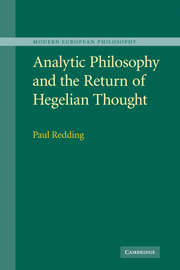Book contents
- Frontmatter
- Contents
- Acknowledgements
- Introduction: analytic philosophy and the fall and rise of the Kant–Hegel tradition
- 1 McDowell, Sellars and the myth of the perceptually given
- 2 Brandom, Sellars and the myth of the logical given
- 3 Individuation and determinate negation in Kant and Hegel
- 4 The Kantian route to Hegel's inferentialism
- 5 Aristotelian Phronesis and the perceptual discernment of value
- 6 Kant, Hegel and the dynamics of evaluative reason
- 7 Hegel and contradiction
- 8 Hegel, analytic philosophy and the question of metaphysics
- Bibliography
- Index
4 - The Kantian route to Hegel's inferentialism
Published online by Cambridge University Press: 22 September 2009
- Frontmatter
- Contents
- Acknowledgements
- Introduction: analytic philosophy and the fall and rise of the Kant–Hegel tradition
- 1 McDowell, Sellars and the myth of the perceptually given
- 2 Brandom, Sellars and the myth of the logical given
- 3 Individuation and determinate negation in Kant and Hegel
- 4 The Kantian route to Hegel's inferentialism
- 5 Aristotelian Phronesis and the perceptual discernment of value
- 6 Kant, Hegel and the dynamics of evaluative reason
- 7 Hegel and contradiction
- 8 Hegel, analytic philosophy and the question of metaphysics
- Bibliography
- Index
Summary
Kant's legacy within analytic-styled theoretical philosophy tends to be centred on those parts of the Critique of Pure Reason that are dealt with in the ‘Transcendental Analytic’. From this point of view, the lessons of the even longer ‘Transcendental Dialectic’ can be summed up in its generally anti-metaphysical purport: one cannot discover truths about the world from pure thought alone – or at least, pure thought when it is restricted to reasoning schematized by syllogistic logic. Viewed from this perspective, Hegel looks to be a regression, as he seems to want to re-instate some sort of metaphysics just on such syllogistic logical grounds. While Kant had warned in the ‘Paralogisms’ and ‘Antinomies’ that pure reason conceived theoretically (‘metaphysics’) would be wrecked on the reef of contradiction, Hegel seems to have taken this entanglement in contradiction as revealing something about reality itself – its contradictoriness – and this alone has commonly been taken as sufficient warrant to exclude his response to Kant from serious consideration. But as we have seen, working from Sellars's critique of any idea of an intuitable logical ‘given’, Brandom claims to have resurrected the rational ‘inferentialist’ core of Hegel's very appeal to ‘Reason’ over ‘the Understanding’. While Hegel's controversial approach to contradiction will be examined in later chapters, in this chapter I trace the complicated relations between Kant and Hegel on the status of inferential reason.
- Type
- Chapter
- Information
- Analytic Philosophy and the Return of Hegelian Thought , pp. 115 - 144Publisher: Cambridge University PressPrint publication year: 2007

